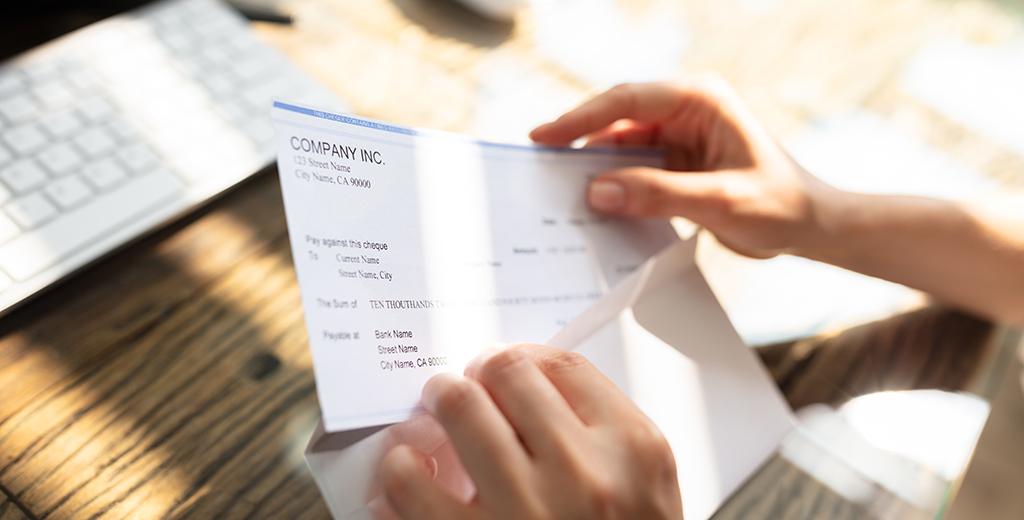Check Fraud is Evolving – Here’s How to Protect Yourself

With the world of payments changing every day, many of us have left our checkbooks behind in favor of payment apps and credit cards. So, it might seem hard to believe that check fraud and scams are still so prevalent.
Check fraud is a catchall term for several types of criminal activity that involve the illegal use of checks, including forging signatures, copying or altering checks and even elaborate fake check scams.
Often it can start with a single stolen check – it could be blank, cancelled or even filled out and ready to deposit. Fraudsters might steal it from an unattended purse, car or even your home. Once they have a check, these thieves can start using it to steal from the account holder and defraud others.
Fake check scams are becoming increasingly common. Scammers will send a check to deposit and then ask you to send a portion of it back or to someone else, often in the form of gift cards, wire transfers or even peer-to-peer payment apps – which are basically untraceable. Here are a few tactics they use:
Fake COVID-19 Stimulus Checks – Scammers impersonate the IRS by sending checks that look like legitimate economic-impact payments, then they contact you claiming you were overpaid and need to send money1.
Phony Job Offers – These can take the form of being a Mystery Shopper, Personal Assistant or even using your car to advertise. Scammers will send a fake check and instruct you to use it to buy gift cards, money orders or pay third party vendors for services. Once you follow their instructions, they disappear. It’s common for this type of scam to target college students by posing as school representatives via email2.
Overpayments – If you’re selling an item, these scammers will pose as buyers. They will write you a fake check for your item, but it will be for over the amount you agreed on. They’ll play it off as a mistake then ask you to send back the difference.
Prizes and Lotteries – “Congratulations, you won!” These scammers will send you a fake prize check that requires you to send back a processing or other fee.
Why Do Check Scams Work?
Fraudsters do their best to seem legitimate, and the technology they use can be so sophisticated that fraudulent checks can be hard to spot. They prey on our desire to earn extra cash, win prizes and even be helpful. They pose as people and organizations we can trust. And they take advantage of the banking system.
By law, banks need to make check deposits available relatively quickly. When you deposit a check, you’re able to use that money within a few days, but it can take longer to uncover a fake check. If it’s discovered later that the check is bad and it bounces, the money from the check is taken out of the account it was deposited into. Even if you unknowingly deposited a fake check, you’ll be responsible for that money.
What You Can Do to Protect Yourself from Check Fraud
Store your checks securely – Keep your checks and bank documents in a secure location. Never leave them in your car, even if it’s locked. Then dispose of old documents properly – fraudsters are known to dumpster dive to steal these important documents.
Report missing checks immediately – If you notice that any of your blank checks, cancelled checks or checks made out to you unexpectedly go missing, tell the bank immediately. This could be a sign that they’ve been stolen, and the bank can take proactive steps to safeguard your account and money.
If someone sends you a check and asks you to send money, don’t do it. – No matter what their story is, it’s likely a fake check scam.
Don’t accept checks that include an overpayment – If you’re selling an item, never accept a check that’s written for more than you agreed on.
Be wary of unsolicited emails and mail – Scammers use these methods to lure victims. If you receive something suspicious or from someone you don’t know, don’t reply, follow any instructions or click on any links.
Mailing a Check? Take Precautions – Limit the chances for a scammer to get a hold of an unaccompanied check. Never mail a check from an unlocked mailbox – take it to the post office instead. Always write the person or business you’re sending the check to on the payee line, do not mail a check payable to cash. Better yet, use services like Online Billpay whenever possible.
Don’t Count on a “Cleared” check: Keep in mind that just because the money is available in your account to use, doesn’t mean the check was good.
If You’re the Victim of Check Fraud – Report it!
Don’t be embarrassed to report check fraud. Your report can help catch criminals and help others avoid falling victim to their crimes! Once you realize what’s happened, notify local law enforcement and the bank immediately.
After you do that, here are several other places you can make a report:
- Federal Trade Commission at ReportFraud.ftc.gov
- State and Local consumer protection agencies or your state attorney general
- United States Postal Inspection Service at uspis.gov/report for frauds conducted using the mail.
- FBI’s Internet Crime Complaint Center at ic3.gov for frauds conducted over the internet.
While spotting and stopping check fraud can be difficult at times, safeguarding your checks and remaining skeptical if someone offers you a check can help protect you from scammers.
Sources:
- Coronavirus stimulus payment scams: What you need to know | FTC Consumer Information
- New FTC Data Spotlight: Fake Check Scams Cause Big Losses, Especially for Consumers in Their Twenties | Federal Trade Commission